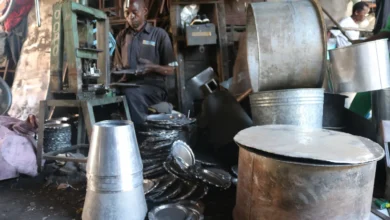
Farmers in Nakuru County have been supplied with over six tons of certified potato seeds to boost production.
Governor Lee Kinyanjui said more than 20 groups of farmers specializing in potato production in Kuresoi South, Molo, Kuresoi North, Bahati, Gilgil and Njoro sub-counties have been identified for the seeds that are being issued at no cost to the farmer.
In a press briefing, Governor Kinyanjui said the devolved unit was the second-largest producer of the crop in the country.
He was flanked by County Executive Committee Member for Agriculture Dr. Immaculate Maina and Potato Liaison Officer, Ms. Lynnette Echessa.
Farmer Groups from Molo and Kuresoi North sub-counties received the Kenya Karibu variety while those in Bahati, Gilgil and Njoro sub-counties were supplied with the Dutch Robin variety.
“Scarcity of certified potato seeds in Kenya has stagnated production of the crop at seven tons per hectare against a potential of 40 tons. Only one percent of potato farmers in the country use official seeds with the rest using recycled seeds from their farms and the informal sector thereby leading to low production of the crop,” said Maina.
According to the Ministry of Agriculture, Fisheries, Livestock and Cooperatives, Kenya’s potato seed demand stands at 30,000 tonnes annually but the country only produces 6,700 tonnes with most farmers recycling previous crops to use as seed, a move that has been blamed for the shortage that the country faces.
The report indicates that Kenya produces about two million tonnes of potatoes annually even though the country has the potential of yielding up to eight million tonnes.
Also Read:
- Security personnel mount crackdown on traders flouting potato regulations
- Government will not interfere with the setting of potato prices
- Kenya’s first Ksh.3 billion fertilizer plant starts operations in Nakuru
Nakuru County is working with various government agencies, research institutions and farmer groups in promoting new farming technologies for breeding multiple disease-free and high-yielding seeds as a way of unlocking the over Ksh.15 billion potential of potato farming in the devolved unit.
“We are closely partnering with the Kenya Plant Health Inspectorate Service (KEPHIS), Agriculture Development Corporation, Egerton University, Baraka Agricultural College and Kenya Agricultural and Livestock Research Organization (KALRO) in encouraging both smallholder and large scale farmers to adopt aeroponics, hydroponics and apical stem cutting technologies used to produce basic potato seed,” said Governor Kinyanjui.
Irish potato (Solanum tuberosum) is the second most important food crop in Kenya, after maize. Due to low multiplication rates, however, it takes seven seasons of seed production before a farmer can afford certified seed.
Certified seed will help farmers to increase their incomes through high yields and early maturity of the crop. The varieties that the groups have received are disease and pest-resistant and drought-tolerant.
The top producing potato counties in Kenya are Nyandarua (29.8 percent), Nakuru (18.9 percent) and Elgeyo Marakwet (16.2 percent).
Other potato producing regions include Makueni, Meru, Embu, Nyeri, Tharaka-Nithi, Samburu, Kajiado and Kwale. Kiambu, Taita Taveta, Nakuru, Narok, Bomet, Trans Nzoia, Uasin Gishu and West Pokot also register significant yields.
Countrywide, the crop is grown by 600,000 to 800,000 farmers with a total production of 1 to 1.4 million tonnes worth Ksh.30 to Ksh.40 billion per year. Small scale farmers contribute 83 percent of the total production.
The potato sub-sector supports 3.8 million people directly and indirectly with the National Potato Council of Kenya putting its worth at over Ksh.50 billion.





